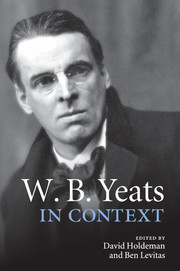Description
W. B. Yeats in Context
Literature in Context Series
Coordinators: Holdeman David, Levitas Ben
This book explores Yeats' background and influences, as well as how his works shaped early twentieth-century Irish culture.
Language: English
W. B. Yeats in Context
Publication date: 12-2015
Support: Print on demand
Publication date: 12-2015
Support: Print on demand
W b yeats in context
Publication date: 12-2009
460 p. · 16x23.5 cm · Hardback
Publication date: 12-2009
460 p. · 16x23.5 cm · Hardback
Description
/li>Contents
/li>Biography
/li>
W. B. Yeats is a writer who requires, and at the same time tests the limits of, contextual study. More than perhaps any other Irish writer, he produced his own context as much as it produced him. His cultural and political activities, combined with his prolific literary output, made an impact that can only be understood by close attention to his words in relation to the times in which he lived. W. B. Yeats in Context maps Yeats' world in concise, lively essays by distinguished critics and historians. The places, people, themes and intellectual frameworks most important to his development receive close attention, as do his artistic influences, and the production and reception of his work. As a gateway into the study of Yeats, this volume offers much new information for both students, scholars and anyone interested in the life and times of this enigmatic and influential poet.
Introduction David Holdeman and Ben Levitas; Part I. Times: 1. Church, state, childhood, and youth, 1865–85 W. J. McCormack; 2. The fin de siècle, 1885–97 Stephen Regan; 3. Anger management, 1898–1913 Adrian Frazier; 4. War, 1914–23 Ben Levitas; 5. The Irish Free State and the European crisis, 1924–39 Paul Scott Stanfield; Part II. Places: 6. Sligo David Fitzpatrick; 7. London Timothy Webb; 8. Dublin Anthony Roche; 9. Galway: Coole and Ballylee Jonathan Allison; Part III. Personalities: 10. John Butler Yeats Douglas Archibald; 11. Maud Gonne Karen Steele; 12. Lady Gregory Judith Hill; 13. J. M. Synge Nicholas Grene; 14. Ezra Pound Catherine E. Paul; 15. George Yeats Margaret Mills Harper; Part IV. Themes: 16. Class and eugenics Donald J. Childs; 17. Nationalism and postcolonialism David Lloyd; 18. Gender Vicki Mahaffey; 19. Aesthetics James Pethica; 20. Fascism R. F. Foster; Part V. Philosophies: 21. The Church in Ireland: Protestant and Catholic Nicholas Allen; 22. Occultism Timothy Materer; 23. Folklore Sinéad Garrigan Mattar; 24. Indian thought Shalini Sikka; 25. Nietzsche Michael Valdez Moses; 26. Classical philosophy Matthew Gibson; 27. Landscape, family, eighteenth-century Ireland Jefferson Holdridge; Part VI. Arts: 28. Nineteenth-century Irish poetry Phillip L. Marcus; 29. The English Romantic Symbolists Matthew Campbell; 30. Modern poetry James Longenbach; 31. Theatrical culture Richard Cave; 32. The visual arts Elizabeth Bergmann Loizeaux; 33. Modern fiction Frank Shovlin; Part VII. Reception: 34. Manuscripts and revisions David Holdeman; 35. Publishers and the material text George Bornstein; 36. Critical debate, 1939–70 Edna Longley; 37. Critical debate, 1970–2006 Rob Doggett; 38. Popular culture Geraldine Higgins; Guide to further reading; Index.
David Holdeman is Professor of English at the University of North Texas.
Ben Levitas is Lecturer in the Department of Drama at Goldsmiths College, University of London.
Ben Levitas is Lecturer in the Department of Drama at Goldsmiths College, University of London.
© 2024 LAVOISIER S.A.S.
These books may interest you

Yeats on Theatre 96.56 €

Yeats and Theosophy 58.78 €

Yeats and Modern Poetry 91.54 €


